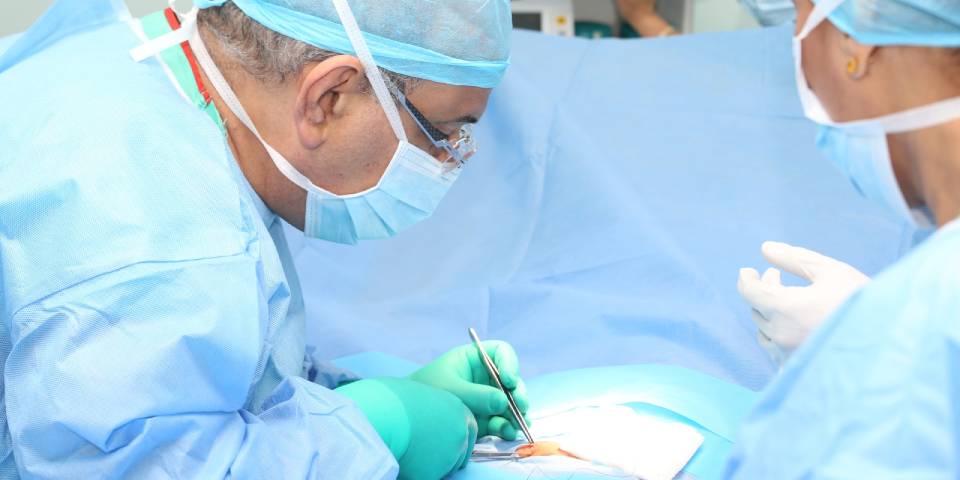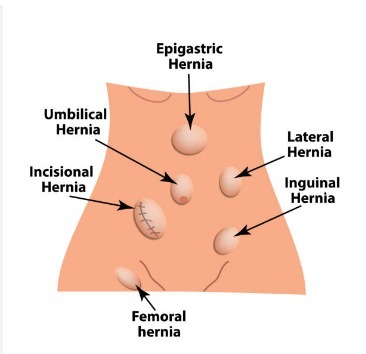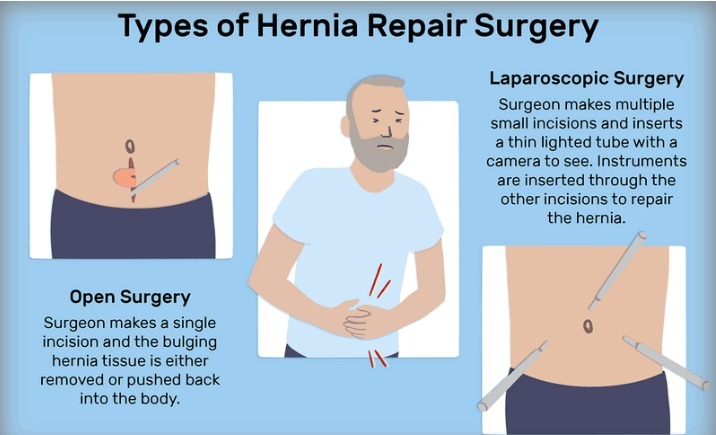Best Hernia Specialist in Bangalore

Dr. Bhushan Chittawadagi is a leading and Best hernia specialist in Bangalore and an international specialist doctor working at Hosmat Hospital, treating all types of hernias, from simple to highly complex. He has successfully done over 500+ hernia surgery. Apart from surgery, Dr. Bhushan will also help you with hernia treatments, hernia prevention, and many more. Dr. Bhushan Chittawadagi has repaired thousands of hernias with advanced mesh repair techniques making him one of the best hernia specialists in Bangalore. You can be sure that you are being treated by the best gastroenterologist doctor in Bangalore who is dedicated to hernia repair and Surgery.
Dr. Bhushan Chittawadagi is a highly qualified and experienced surgeon specializing in both cancerous and non-cancerous disorders of the esophagus and stomach. He holds an MBBS degree from Shri B M Patil Medical College, Vijayapur, Karnataka, India, and an MS in General Surgery from Dr. Vaishampayan Memorial government medical college, Solapur, Maharashtra, India. He also completed a sub-specialization in Surgical Gastroenterology from Gem Hospital & Research Centre, Coimbatore, Tamil Nadu, India.
Dr. Bhushan has worked in various prestigious hospitals in India, including HOSMAT Hospital, Kalyan Nagar, Bangalore, HCG Cancer, KR Unit, Bangalore, and Sparsh Hospital, Bangalore. He has also served as an Assistant Professor at Sree Mookambika Institute of Medical Sciences Kulasekharam, Tamil Nadu.
Dr. Bhushan is a leading hernia specialist in Bangalore with his extensive experience in laparoscopic surgery, including robotic surgery, and is well-versed in the treatment and diagnosis of GERD, Barrett’s esophagus, achalasia, hiatal hernia, and para esophageal hernia, among others. He is also skilled in diagnostic endoscopies and colonoscopies, with the ability to perform basic interventional endoscopies such as biopsies, polypectomies, and stent removal.
Dr. Bhushan has published 15 papers in major PUBMED-indexed national and international journals and has won 7 national and international awards for his academic contributions. With his vast knowledge and expertise, Dr. Bhushan is considered one of the best hernia surgeons in Bangalore.
What is a hernia?
Hernias are bulges in the belly where intestines and abdominal fat come out under the skin through a defect or hole or weak spot in the abdomen. The defect may be in a scar from a previous operation or a naturally present gap in the abdomen. Hence, the common sites for hernias are the groin, navel, abdomen, or a previous operation site. A hernia is becoming a very prevalent disease these days and people are availing hernia surgery to address them effectively. A hernia does now not get higher through the years, nor will it depart through itself. There are no exercises or physical therapy regimens or yoga that can make a hernia depart. You must visit a hernia specialist doctor/surgeon for hernia treatment.
What are the Types of Hernias?
A hernia can occur anywhere in the abdomen region. Patients will normally notice a lump, or discomfort, at the site of the hernia. The most common types of hernia are:
- Inguinal hernia – when tissue (usually part of the intestines) pokes through your lower abdomen.
- Femoral hernia – when tissue pokes through into your groin, or the top of your inner thigh.
- Incisional hernia – when tissue pokes through a surgical wound or incision that has not fully healed.
- Umbilical/Paraumbilical hernias – when tissue pokes through the part of the abdomen directly through or immediately around the navel (belly button)
- Epigastric Hernia – when tissue pokes through into the upper part of the abdomen
- Spigelian hernia – This is a rare type of hernia that appears on the edge of one of the rectus abdominis muscles (these muscles are described as the “six-pack” which are readily seen in athletic individuals) 4 or 5 cm below the “belly button”.

What is a complex hernia?
A complex hernia often occurs at the site of an earlier hernia repair and the hernia has returned. With repeated attempts at the repair of hernias, the surrounding tissue can become weak or stretched and it may need to be augmented or replaced. Large hernias of the abdominal wall can result in deformity of the abdominal wall requiring a complex hernia repair. The presence of a fistula makes the repair even more complicated.
What are the causes of Hernia?
Bangalore’s renowned hernia specialist According to Dr. Bhushan Chittawadagi, a hernia develops when an organ or tissue is pushed out by pressure from an opening or weakened muscles in the patient’s fascia. This weak region may be present from birth or develop later in life. Any pressure on the abdomen can cause a hernia, which can occur in the following situations:
- Chronic sneezing or coughing
- Diarrhea and constipation
- Lifting heavy objects without sufficient abdominal muscle support
- Other factors that might cause weak muscles and hernias include smoking, obesity, lack of a nutritious diet, etc
Signs and Symptoms of Hernia:
- Lump in the groin area when standing/straining & disappears when reclining
- Pain at the site of the lump, especially when lifting a heavy object
- Swelling of the scrotum
- Excruciating abdominal pain (if you have strangulation)
- Nausea, vomiting, loss of appetite & pain (if intestinal obstruction occurs)
How Hernia is Diagnosed by Dr.Bhushan Chittawadagi?
Hernia is a common medical condition that occurs when an organ or tissue protrudes through a weak spot in the surrounding muscles and connective tissue. It can occur in various parts of the body, including the abdomen, groin, and upper thigh. Diagnosis of a hernia requires a thorough medical examination and certain diagnostic tests. Dr. Bhushan Chittawadagi will discuss the diagnostic methods used to identify hernias.
Medical Examination: A medical examination is the first step in diagnosing a hernia. The doctor will examine the patient’s abdomen, groin, and other areas where hernias can occur. The patient may be asked to cough or strain, which can help the doctor identify the hernia. During the examination, the doctor will also look for other signs and symptoms, such as pain, swelling, or a bulge in the affected area.
Imaging Tests: If a hernia is suspected, the doctor may order imaging tests to confirm the diagnosis. These tests can include:
- Ultrasound: An ultrasound uses high-frequency sound waves to create images of the inside of the body. This can help the doctor see if there is a hernia and the size and location of the hernia.
- CT Scan: A CT scan uses X-rays and computer technology to create detailed images of the inside of the body. This can help the doctor see the hernia and any other underlying conditions that may be causing the hernia.
- MRI: An MRI uses a powerful magnet and radio waves to create detailed images of the inside of the body. This can help the doctor see the hernia and any other underlying conditions.
Hernia Treatment in Bangalore:

Hernia is a medical condition that occurs when an organ or tissue protrudes through a weak spot in the surrounding muscles and connective tissue. Treatment of a hernia requires medical intervention, and the appropriate course of treatment depends on the size and location of the hernia, as well as the severity of the symptoms. Dr. Bhushan Chittawadagi will discuss the various treatment options available for a hernia.
Watchful Waiting: If the hernia is small and not causing any symptoms, the doctor may recommend watchful waiting. This involves monitoring the hernia for any changes, such as an increase in size or the development of symptoms. The doctor may recommend lifestyle changes, such as avoiding heavy lifting, to reduce the risk of the hernia worsening. Watchful waiting is typically recommended for inguinal hernias in men and umbilical hernias in infants.
Surgery: If the hernia is large or causing symptoms, surgery may be necessary to repair the hernia. There are several surgical options available for hernia repair, including:
- Open Surgery: This involves making an incision in the affected area to access and repair the hernia. This is typically performed under general anesthesia.
- Laparoscopic Surgery: This involves making several small incisions in the abdomen and using a laparoscope to repair the hernia. This is typically performed under general anesthesia.
- Robotic Surgery: This involves using a robotic system to assist with the repair of the hernia. This is typically performed under general anesthesia.
Truss or Belt: In some cases, the doctor may recommend a truss or belt to help support the hernia and reduce symptoms. However, this is typically only recommended for small hernias that are not causing any symptoms.
In conclusion, hernia can be treated through watchful waiting, surgery, or the use of a truss or belt. The appropriate course of treatment depends on the size and location of the hernia, as well as the severity of symptoms. If you suspect you may have a hernia, it’s important to see a doctor as soon as possible to receive an accurate diagnosis and appropriate treatment.
How much does Hernia Surgery cost in Bangalore?
Dr. Bhushan Chittawadagi is one of the best hernia surgeon in Bangalore. Hernia surgery in Bangalore is a very affordable and low-cost procedure that takes very little time to operate and does not require a long doctor’s stay. Hernia Surgery in Bangalore cost Starting from ₹ 55,ooo. The cost of hernia surgery depends on many factors. While the starting price is ₹ 55,000, the average price is ₹ 65,000, the maximum price is ₹ 110,000 it only depends on the type of surgery, patient’s condition, surgeon’s skill, location, and hospital cost.
Why choose Dr. Bhushan for Hernia Treatment?
Choosing the right doctor for hernia treatment is crucial to ensure the best possible outcome. Dr. Bhushan Chittawadagi is a highly experienced and skilled surgeon who specializes in the treatment of hernias. Here are some reasons why he is an excellent choice for hernia treatment:
- Expertise: Dr. Bhushan Chittawadagi has years of experience in the field of general and laparoscopic surgery. He has performed numerous hernia surgeries and is highly skilled in the latest surgical techniques.
- Compassionate Care: Dr. Bhushan Chittawadagi is known for his compassionate and patient-centered approach to care. He takes the time to listen to his patients’ concerns and works closely with them to develop a personalized treatment plan.
- Advanced Technology: Dr. Bhushan Chittawadagi uses the latest technology and surgical techniques to ensure the best possible outcome for his patients. He is trained in robotic surgery, which allows for a less invasive and more precise surgical procedure.
- Comprehensive Care: Dr. Bhushan Chittawadagi provides comprehensive care for his patients, including pre-operative and post-operative care. He works closely with his patients to ensure they understand their treatment options and are comfortable with the surgical procedure.
- Positive Outcomes: Dr. Bhushan Chittawadagi has a track record of positive outcomes and satisfied patients. He strives to achieve the best possible outcome for each of his patients and is committed to providing the highest quality of care.
In conclusion, choosing Dr. Bhushan Chittawadagi for hernia treatment ensures that you will receive expert, compassionate, and comprehensive care. With his extensive experience, advanced technology, and commitment to positive outcomes, you can trust that you are in good hands.
Talk To Dr. Bhushan Chittawadgi:
Dr. Bhushan Chittawadgi is a consultant and an Advanced Laparoscopic, Gastro, and GI Cancer Surgeon practicing at Hosmat Hospital, Bangalore, Karnataka. He has more than 18 years of experience in the field of Laparoscopic GI & HPB Surgery making him one of the best laparoscopic surgeons in Bengaluru, Karnataka. He is specialized in Laparoscopic hernia surgery, Gall bladder stone, Obesity, liver and pancreas diseases, GI surgery, Piles, and Breast & Thyroid diseases. If you are looking for the best laparoscopic hernia surgeon call us at +91 89407 70990 or book an online appointment here.
Frequently Asked Question (FAQ):
Who is the best hernia doctor in Banagalore?
Dr. Bhushan Chittavadgi is one of the best hernia surgeons in Bangalore with over 18 years of experience in the field of basic and advanced hernia surgery. His experience in the field of laparoscopic GI and HPB surgery makes him the best hernia surgeon in Bangalore, Karnataka.
How many days of rest are required after hernia surgery?
Most people can return to work within 1 to 2 weeks after surgery. But if your job requires that you do heavy lifting or strenuous activity, you may need to take 4 to 6 weeks off from work. You may shower 24 to 48 hours after surgery if your doctor okays it. Pat the cut (incision) dry.
How much bed rest is required after hernia surgery?
Umbilical hernia surgery recovery time is about two weeks. This two-week restriction helps reduce pain after surgery, and likely reduces the risk of a hernia recurrence.
Can I sit after hernia surgery?
Sitting: for several days after surgery sitting may be uncomfortable. You may have to get up and move around and change positions periodically. Stairs: no limitations. Lifting: for the first-week lifting is limited to 20 pounds.
Does smoking affect Hernia?
Yes, smoking can increase the risk of developing a hernia. Smoking weakens the muscles and connective tissue in the body, which can lead to the development of hernias. Additionally, smoking can increase coughing, which can put pressure on the muscles and increase the risk of a hernia.
What is the risk/complication of hernia surgery?
The risks and complications of hernia surgery can include bleeding, infection, injury to surrounding organs or structures, nerve damage, chronic pain, and recurrence of the hernia. However, these risks can be minimized with careful surgical technique and post-operative care. Your surgeon can discuss these risks with you and help you make an informed decision about your treatment options.
How do you feel during the procedure?
It’s like taking a small nap! All you will feel is a small needle prick during your preparation for the procedure. The surgery usually takes about 20 minutes. Occasionally, only the area with the hernia is anesthetized and you will be awake and probably having a chat with your doctor!
What Happens After the Operation?
Anesthesia will wear off within 2-3 hours after surgery, following which you will gradually be able to move your limbs. Do not take anything by mouth for 4-6 hours after surgery. You can then start with sips of water followed an hour later by a regular full diet, unless advised otherwise ( In a few cases you may need to wait for a day before you resume your regular diet ). As the anesthesia wears off, there may be difficulty in passing urine for the first time. However, this returns to normal and you will be able to pass urine as usual. Mild pain is expected after the surgery which is easily managed with painkillers.
When can I go home?
If your operation is planned as a daycare procedure you can go home as soon as the effect of the anesthetic has worn off, you have passed urine and you are comfortable, eating and drinking. Since a general anesthetic is used frequently used, it is advisable that a responsible adult take you home and stay with you for 24 hours. At times you may be given a discharge after 24 hours in which case you may need to stay in the hospital for a night. Before you are discharged you will be advised about post-operative care, painkillers, and antibiotics.
How long will it take for my complete recovery after the treatment?
This time frame cannot be generalized, as the recovery depends on various factors like the type of hernia you have, the extent of the hernia, your general health and medical condition, the type of surgery, and the expertise of the operating surgeon. As you may have earlier read, in most surgeries you will be discharged from the hospital on the same day or within 24 hours. In the beginning, there may be discomfort during walking, climbing up and down a staircase, and during movement. However, this is easily controlled with painkillers and you should be pain-free within a couple of days.
When can I return to my routine and activities?
In most of cases, the answer would be ‘as soon as you feel you can’. How soon you can also depend on the type of work you do and your normal level of activity. Typically one can return sooner to a sedentary job (3-5 days) than one that involves strenuous physical activity or lifting weights ( 4-6weeks ). This question is best discussed with your operating surgeon.
When should I take help?
Fever > 101 degrees F
Pain not relieved by prescribed medicines
Unusual bleeding
Persistent nausea or vomiting
